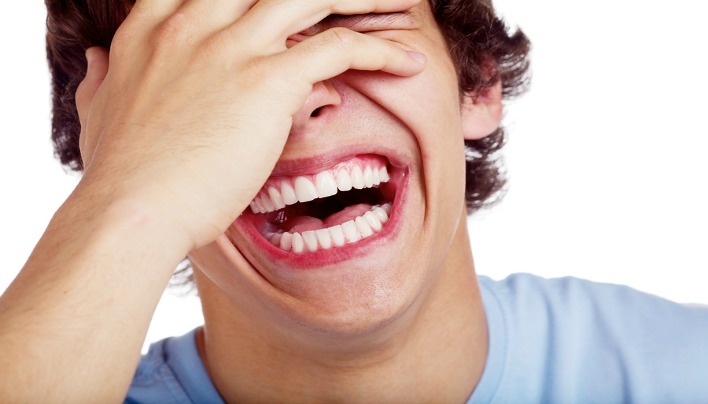The science of 'hahaha'
Many lifelong friendships, Parisian love affairs, and successful business meetings have been sparked by laughter. The science of laughter wasn’t properly attended to until the 1980s. That’s when the developmental neuroscientist, Robert Provine, began to conduct observational studies on this human behavior. He roamed city sidewalks and camped out in food courts, filling notebooks with the sentences that he heard trigger laughter in conversations.
“[My] fieldwork failed to discover The Mother Of All Jokes or even her next of kin,” Professor Provine explained in his 2000 book Laughter. In fact, 80 to 90 percent of pre-laugh comments were innocuous, like, “It was nice meeting you too,” or, “I see your point.”
He concluded that “most pre-laugh dialogue is like that of an interminable television situation comedy scripted by an extremely ungifted writer.”
During his long hours pondering the mysterious phenomenon of funniness in front of an Arby’s, Provine realized that laughter and humor--two words used interchangeably, more or less-- are far from synonymous. In an article for the American Psychological Association (APA), Provine differentiated between laughter as a “primate play vocalization,” and humor as a “more modern, cognitive and linguistic development.”
The theory of laughter as a social bonding tool seems supported by chuckling sounds chimpanzees make when they wrestle each other. For humans, too, laughter serves as a sign of friendly intentions, or a social bonding mechanism. It’s no surprise that extroverts laugh more than introverts.
As we reach adulthood, our conversations begin to follow a mutually-understood rhythm in which laughs function as a beat. One of Provine’s studies found that “congenitally deaf people laughed at the same points in signing conversations that hearing people do in speaking conversations,” seeming to imply that the rhythm of conversations is driven by structure rather than content.
Whenever I read studies like Provine’s—or like the study on how we take 13 milliseconds to decide if we like a new face—I instinctively want to categorize this new social dynamic: is it a good or a bad thing? Do we simply have a bad sense of humor most of the time? How can our most unremarkable comments earn the same laughter as Lucille Bluth’s one-liners (for instance, “I mean, it’s one banana, Michael—what could it cost, 10 dollars?”)?
I wondered if the art of subtlety had lost a significant battle when laughter became nothing more than a useful tool for smoothing over awkward moments. (We've all known that girl who tosses a parting "I love you!" into every goodbye, whether to their brand-new roommate or their House scholar.)
But when I poked around the existing research on humor—the stuff that’s actually clever, defined by the popular “Benign Violation” theory of humor as “non-threatening violations of social norms,” like the cartoonist Ashleigh Brilliant’s quip that “the time for action is past; now is the time for senseless bickering,”—I realized that we might not be able to survive a lifestyle where one-hundred percent of our jokes were funny.
The Terman Life-Cycle Study examined the habits and personality traits that result in the longest lifespans. The study concluded that “those who were rated by parents and teachers as having a higher sense of humor as children were more likely to smoke and consume alcohol as adults; they also died at a younger age when compared to those with less humor,” according to Medical Daily. The researchers suggested that health risks and lifestyle risks are treated lightly by people who have a “healthy” sense of humor.
I say this not to censor Lucille Bluth, but to open the conversation about what we find funny, and why. Do you find yourself cracking jokes to downplay your bad habits? Or, returning to our earlier discussion of laughter as a bonding tool, do you find yourself laughing excessively in conversations with people you want to impress?
And given this recent piece in The Atlantic about how our sense of humor is most aggressive when we're young, how do you think humor functions in the King's community? How does a witty professor influence the classroom dynamic, and your willingness to contribute to the class discussion?

